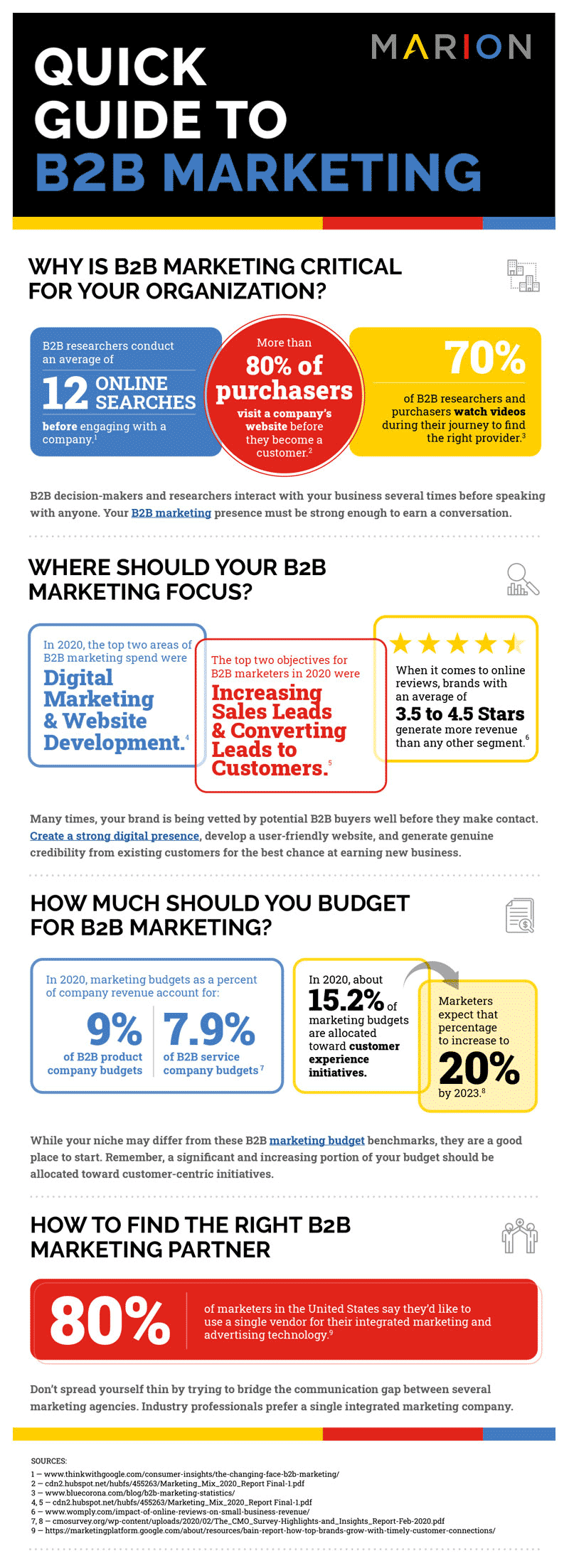Marketing to businesses is a different challenge. While we’re all familiar with marketing as consumers, reaching other businesses (B2B) requires a unique approach compared to consumer-focused (B2C) tactics.
Here’s what we’ve learned in our 40 years of providing outsourced marketing services to Texas businesses.
What is B2B Marketing?
B2B marketing is when one business markets its products or services to another business. It’s essential for companies that supply goods or services that help other businesses operate or improve their own offerings.
Some B2B marketing examples include:
- An industrial pump manufacturer is attempting to market and sell its products to an oil and gas producer.
- A commercial construction company is attempting to market and establish a contract to build out the office space for a law firm.
- A heavy equipment dealership is attempting to market and sell industrial equipment to a construction company.
What is a B2B Marketing Agency?
A B2B marketing agency specializes in crafting marketing strategies that effectively connect your business with other companies. These agencies know how to reach key decision-makers and position premium products or services to stand out in the market.
Why B2B Marketing?
B2B marketing is essential because most companies depend on the products or services of other businesses. Rarely does a company handle every part of its production and distribution in-house. For instance, your favorite clothing brand might source materials from various suppliers, and your phone’s components likely come from multiple vendors.
These partnerships start with effective B2B marketing, connecting companies with what they need to function or grow. Plus, B2B relationships often have high revenue potential. Unlike one-time consumer purchases, business partnerships are often longer-term and higher-value. For example, a landscaping contract for a corporate campus may involve months of service and a substantial budget—much more than a single residential project.
Types of Business-to-Business Marketing
Here are three core B2B marketing techniques to consider. Think about how each might fit into your strategy, and then check out what your competitors are doing to see if these approaches could work in your industry.
Digital Marketing for B2B
Digital marketing is a scalable way to get your products or services in front of the right people. A digital marketing campaign makes it easy to track ROI, and you can use granular targeting to reach decision-makers.
For example, LinkedIn ads can target individuals with certain job roles so that you can directly target a purchasing manager or executive. If your ideal customers are searching for your products or services online, you can use an SEO company to make sure your web pages are at the top of the search results.
Traditional Marketing for B2B
Traditional marketing strategies for the business-to-business market casts a wide net and tends to be expensive, but it helps build brand equity. You can use radio, television, or print ads to grab the attention of your potential customers and remain top of mind. You’ll be in the running when those companies are looking for a new vendor.
Personal Selling for B2B
Personal selling is one of the oldest and most effective B2B marketing methods. Personal selling leverages face-to-face networking and relationships to get deals inked. This is the least scalable way to market your business to other companies, but it has the highest conversion rate.
Personal selling is frequently paired with digital marketing. Digital campaigns generate leads that are followed up in person by a salesperson.
9 Examples of How to Do B2B Marketing (That Actually Work)
When it comes to B2B lead generation, business marketing companies often use nine core strategies. These tried-and-true B2B marketing tactics can help drive growth and increase sales.
- Customer Pain Point Research
- Reviews, Testimonials, & Case Studies
- B2B SEO
- Social Media for Business
- B2B Advertising
- Referral Systems
- Marketing Automation
- Influencer Marketing
- Campaign Tracking and Reporting
1. Research Customer Pain Points
Successful B2B marketing starts by researching what your customers need. Just because you’re offering a product or service doesn’t mean customers will come running. Find out what drives the demand for your product/service and how you can stand apart from the competition.
One way to better identify your customer needs is to form customer user groups. Similar to focus groups for a new product, customer user groups leverage the people who are already benefiting from your offerings. For example, after interviewing your customer user group, you may find that marketing for IT companies is more effective when you focus on the pain point of cloud security. Identifying these pain points can go a long way when tailoring your marketing message.
User groups can be conducted in person, or you can build surveys that uncover the unique pain points that customers experience before searching for your solution.
Other research methods include doing keyword research to discover organic search demand or leveraging existing data about your industry.
2. Prioritize Reviews, Testimonials, and Case Studies
One of the most effective B2B marketing strategies is leveraging reviews, testimonials, and case studies from existing customers. This builds credibility in the eyes of potential customers who need to know your products or services can deliver.
Reviews and testimonials are important to your B2B digital marketing strategy as well. Reviews can be leveraged online to help your brand outrank competitors and improve your organic and Google Ads click-through rates. Learn more about how to get Google reviews for your business today!
Case studies are helpful the closer you get to a purchase decision. For example, when customers have a list of potential product/service providers together, they’ll want to see how you’ve performed in the past. Having a case study of a similar customer might be the proof your prospects need to see before making a big purchase decision.
3. Use B2B SEO
Search engine optimization is a valuable asset to your B2B online marketing. Prospects need to make informed decisions, so they conduct preliminary online research. If you’re not a top result for the product or service you’re selling, you might not even be considered a potential vendor.
One way to improve your SEO is by leveraging content marketing for your business website. Content marketing helps position your brand as an authority to both search engines and users. In fact, content strategy has proven to have a major role in B2B manufacturing marketing and manufacturing web design. Both of these work together to improve SEO for manufacturers and drive organic search traffic. By regularly publishing highly educational content, you show your subject matter expertise and help users make more informed decisions.
4. Use Social Media for Business
Simply put, being active on social media isn’t optional anymore. Business buyers often check social channels to get a sense of your company’s reputation and culture. In fields like marketing or professional services, your social presence can be especially influential. But with organic reach on the decline, standing out may mean setting aside a budget for paid social media ads.
5. B2B Advertising
Your B2B internet marketing should include paid spend on search and social media. These paid B2B marketing services can generate great ROI if done correctly.
Learning how to successfully advertise on social media can help you meet your prospects where they already spend their time. The decision-makers and purchasing managers that you’re targeting represent businesses, but they are just people at the end of the day. They spend time on social media channels, and you can use the advanced targeting features of today’s popular social channels to reach them.
Paid search is also a great way to target relevant prospects. The difference between organic vs. paid search is that you can jump the line and appear at the top of the search results without having to pour time into SEO.
Paid search targets your prospects for their exact interest at the exact moment they’re interested. Traditional marketing often relies on user demographics for targeting. This is why many business to business marketing strategies prioritize digital over traditional.
6. Set Up a Customer Referral System
Referrals are a great way to drive new business but are often overlooked in favor of digital methods. Set up a process for gathering referrals by checking in with satisfied clients regularly.
For example, a commercial lawn care company might send out a six-month email for feedback and kindly request referrals from happy clients. For even more traction, consider offering incentives, like a small discount or credit for each new referral, which can create a steady revenue stream with minimal cost.
7. Use Marketing Automation
Marketing automation helps you connect with leads, nurture prospects, and streamline all your marketing channels. For instance, if someone downloads a case study, an automated follow-up email could share more tailored insights, maximizing engagement from each contact. Just ensure you don’t overwhelm your contacts—too many emails or overly personalized messages can lead to unsubscribes.
8. Use Influencer Marketing
Partnering with influencers can be a very effective creative marketing strategy for B2B businesses. It makes the most sense to leverage this if there are well-known public figures for the industry you’re targeting.
Going back to our commercial construction example, if your construction firm is trying to get contracts for restaurant build-outs you could partner with a public figure that most restaurant owners follow. Sponsoring a promotional article about your restaurant designs on Gordon Ramsay or Guy Fieri’s blog could be a great way to generate leads.
There’s a good chance you know about local influencers in your target industries. If you’re operating a local business, these local influencers are probably a relevant and cost-effective way to improve your business to business marketing effectiveness. Learn how to advertise a small business locally.
9. Track Your Campaigns and Use Reports
How will you know if your B2B marketing strategies are effective? Before you implement any digital content strategy, develop a system for tracking its effectiveness.
If you’re engaging in B2B SEO, what will you use to measure rankings, organic traffic, and conversions? If you’re advertising on social media, do you have to correct pixels installed so that you can trace marketing ROI back to its source?
If you’re using forms of traditional marketing for B2B, they might be more difficult to track. However, just because something’s difficult to track doesn’t mean you should avoid measuring it. If you want to improve your marketing effectiveness over time, you’ll need to track and regularly review reports about the marketing KPIs that matter most to your business.
Let MARION’s Experts Handle Your B2B Digital Marketing Strategy
At MARION, we have over 40 years of experience with B2B marketing in Houston and Austin, Texas. Our marketing team consists of digital marketing, graphic design, and traditional marketing experts with proven track records.
Contact us today to schedule a consultation and discover how we can help your business grow!




